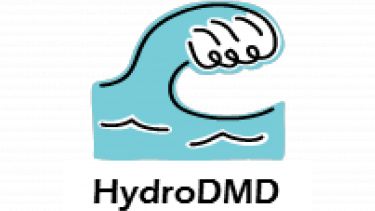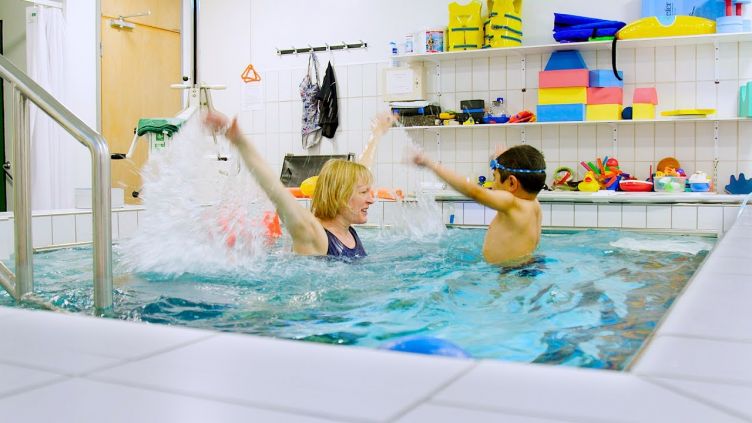HYDRO-DMD research study
Hydrotherapy for Duchenne Muscular Dystrophy (DMD): a pilot and feasibility randomised controlled trial in children.
Challenges
Physiotherapy is thought to help children with Duchenne muscular dystrophy (DMD) stay physically active.
Aquatic therapy (hydrotherapy), physiotherapy in warm water, allows exercise and stretching which are not possible on land. It is not clear that aquatic therapy works, so NHS access is limited. This pilot study was funded to see if a controlled trial of aquatic therapy for DMD was feasible.
We wanted to enrol 40 children with 20 having aquatic therapy. If we succeeded, we could say that a full-scale study was feasible.
Research
Mixed methods feasibility study incorporating external pilot RCT, qualitative case study, cost-impact analysis. All children were asked to do stretching and exercise at home.
We planned that half would have aquatic therapy in hospital pools for half an hour, twice a week for six months.
We measured how well they could use their legs at the beginning and end. After this, children, parents and physiotherapists told us how they felt about aquatic therapy and the study.
Results
Lay Summary Video
We screened 348 children with DMD for the study. Only twelve could enter the study. This is too few to show if aquatic therapy works or not.
Those involved said it should be offered nearer to their homes than we managed. Not enough children could be found for a full-scale study run only from hospitals.
Local aquatic therapy programmes should be designed by children, parents, physiotherapists and teaching assistants. Standard trial designs may not be feasible. Other research designs might be needed to test aquatic therapy.
What people said
Some children who had aquatic therapy felt better
"I couldnÔÇÖt jump and now I can" (Child)
"the next day the body is more refreshed  it was nice way to start the day" (parent)
But some didn't improve.
"Unfortunately, I couldnÔÇÖt find any kind of good positive result from hydrotherapy" (parent)
It wasn't just about how well your legs worked...
He really did come out of himself and be excitable in the pool and actually chat to the physiotherapists rather than being the reserved child he often is in public" (Parent)
One child was very tired and had some pain after the aquatic therapy:
ÔÇ£Well I get really exhausted I feel like I wanna go to bed, but obviously I canÔÇÖt go to bed because I have to go to school... when I get in class my legs are in a little bit of pain but then, when itÔÇÖs the afternoon my legs feel better.ÔÇØ (Child)
Travelling to the hospital pools to do aquatic therapy was tough:
"It was probably only fifteen miles each way, but via the school and then rush hour traffic. Bear in mind my session was at four oÔÇÖclock so sometimes it was an hour and a half on the way back, not a challenge unless youÔÇÖve got a five month old screaming baby in the back.ÔÇØ
Physiotherapists had different opinions about aquatic therapy.
"I mean IÔÇÖve often said ÔÇÿthis child needs hydro'... but I think I would be even more dogmatic now and say ÔÇÿlook it really is a good interventionÔÇÖ."
ÔÇ£All heÔÇÖs done is get progressively worse and had more and more issues at school with fatigue and I think weÔÇÖve affected his quality of life very negativelyÔÇØ
Impact
Before our study was neither robust data nor internationally-agreed guidelines on the effectiveness or optimal content of physical therapies for Duchenne Muscular Dystrophy. We created and tested manuals for land-based and aquatic therapy which are publicly available.
Publications
Hind D, Parkin J, Whitworth V, Rex S, Young T, Hampson L, et al. Aquatic Therapy for Children with Duchenne muscular dystrophy: a pilot-feasibility randomised controlled trial and mixed-methods process evaluation. Health Technol Assess 2017;21(XX). [In press]
Hind D, Parkin J, Whitworth V. Rex S. Young T, Hampson L. et al. Aquatic therapy for boys with Duchenne muscular dystrophy (DMD): an external pilot randomised controlled trial. Pilot and Feasibility Studies. DOI : 10.1186/s40814-017-0132-0 [In press]
Main M, Epps H, Hind D, Scott E, Sheehan J, Geary M, et al. Development and initial experience with aquatic therapy and land-based physiotherapy manuals for children with Duchenne Muscular Dystrophy. [Manuscript under consideration at journal]
HydroDMD Final Report
The HydroDMD Final Report can be found .
Project staff
| Name | Site | Telephone Number | |
|---|---|---|---|
| Dr Peter Baxter Chief Investigator |
91╠¢╗¿ Children's NHS Foundation Trust | 0114 2717612 |
peter.baxter@sch.nhs.uk |
| Elaine Scott Local Co-Investigator |
ScHARR, 91╠¢╗¿ | 0114 2224301 | elaine.scott@sheffield.ac.uk |
| Dr Daniel Hind CTRU Assistant Director |
ScHARR, 91╠¢╗¿ | 0114 2220707 | d.hind@sheffield.ac.uk |
| Chin Maguire Study Manager |
ScHARR, 91╠¢╗¿ | 0114 2220717 | c.maguire@sheffield.ac.uk |
| Amanda Loban Data Manager |
ScHARR, 91╠¢╗¿ | 0114 2220685 | a.loban@sheffield.ac.uk |
| Hannah Cantrill Research Assistant |
ScHARR, 91╠¢╗¿ | 0114 2224347 | h.cantrill@sheffield.ac.uk |
|
Ellen Lee |
ScHARR, 91╠¢╗¿ | 0114 2220805 | e.lee@sheffield.ac.uk |
| Tracey Young Senior Health Economist |
ScHARR, 91╠¢╗¿ | 0114 2220837 | t.a.young@sheffield.ac.uk |
|
Katie Walker |
ScHARR, 91╠¢╗¿ | 0114 2220892 | k.m.walker@sheffield.ac.uk |
| Jenny Freeman Senior Statisitician |
The University of Leeds |
j.freeman@leeds.ac.uk |
|
| Gillian Gatenby Sponsor |
91╠¢╗¿ Children's NHS Foundation Trust | 0114 3053219 | gillian.gatenby@sch.nhs.uk |
Project sites
| City | Site study members | Site | Study role |
|---|---|---|---|
| 91╠¢╗¿ | Noeleen Goulbourne | 91╠¢╗¿ Children's Foundation Trust | Principal Investigator |
| London | Marion Main | Great Ormond Street Hospital for Children NHS Foundation Trust | Principal Investigator |
| Leeds | Lindsey Pallant | Leeds Teaching Hospitals NHS Foundation Trust | Principal Investigator |
| Birmingham | Heather McMurchie | Birmingham Children's Hospital NHS Foundation Trust | Principal Investigator |
| Southampton | Michelle Geary | Southampton Children's Hospital NHS Foundation Trust | Principal Investigator |
|
Oswestry |
Tracey Willis | Robert Jones and Agnes Hunt Orthopaedic Hospital NHS Foundation Trust | Principal Investigator |


